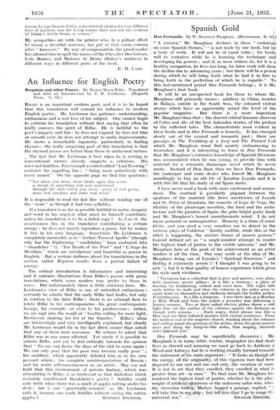An Influence for English Poetry
RILKE is an impOrtant modern poet, and it is to be hoped that this translation will extend his influence to modern English poetry. Mr. Leishman has patience, understanding, enthusiasm and a real love of his subject. One cannot begin to criticize his translation without first saying that often he really conveys the spirit of Rilke. He is faithfiil to the
poet's imagery and line : he does not expand, he does not blur or smooth over, he does not attempt to make improvements. He shows a remarkable ingenuity, particularly in finding rhymes : the really surprising part of this translation is that the rhymed poems are better than those in unrhymed metres.
The fact that Mr. Leishman is best when he is writing in Conventional metres already suggests a criticism. His ear is not faultless. For example a sonnet called " Last Evening" contains the appalling line : " Suing more seductively with every sound." On the opposite page we find this quatrain :
" Yet when you went, there broke upon this scene a streak of something real and understood
throueh the cleft which you went : green of real green,
• some real sunshine and some real wood."
It is impossible to read the last line without reading one of the "reels" as though it had two syllables.
If a translator is as far as possible faithful to metre, imagery and word in his original, what must he himself contribute, unless his translation is to be a faded copy ? As I see it, the creativeness lies in the translator contributing a certain energy : he does not merely reproduce a poem, but he makes it live in his own language. Sometimes Mr. Leishman is completely successful, as in " Archaic Torso of Apollo " (though why has the frightening " candelabra " been castrated into chandelier " ?), " The Death of the Poet " and "L'Ange du Meridien," which are satisfactory and beautiful as poems in English. But a' certain dullness about the translations in the
section called Requiem results from a partial failure of energy.
The critical introduction is informative and interesting and it contains illustrations from Rilke's poems with prose translations, which some readers may prefer to those in verse. But unfortunately there is little criticism here. Mr. Leishman's view of Rilke is one of unbridled enthusiasm : certainly he admits that the early Rilke had faults, but only in relation to the later Rilke : there is no attempt here- to relate Rilke to his contemporaries—his great contemporary George, for example—or even to his predecessors;:. rather, we are rapt into the_ world_of Goethe calling for more light, Beethoven shaking his fist at the thunder." Rilke's ideas are interestingly and very intelligently explained, but clearly Mr: Leishman weld& die in the last ditch sooner than admit that any of them were nonsense.. He refuses to admit that Rilke was in any -sense affected. Yet surely it is possible to admire Rilke, and yet to feel critically towards his opinion that" No one can desire the days of the rich to come again : We can only pray that the poor may become really poor " ; his snobbery, which apparently deluded him as to his own
peasant origin ; his complete misinterpretation of Russia ; and his acute self-consciOusness as an artist. May one not hold that this environment of private fantasy, which. was stimulating to Rilke, is as irrelevant as that diabolism which certainly conditioned Baudelaire's poetry ? Schiller could only write when there was a mien of apples rotting under his desk : but is one " practically-minded," as Mr. Leishman calls it, because one reads Schiller without eating the rotten








































 Previous page
Previous page